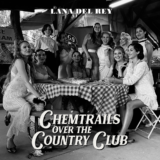

By moniker alone, Chemtrails Over the Country Club would be considered a worthy new chapter in Lana Del Rey’s ongoing subversion of classic (see: myopic) American fantasies.
Chemtrails spell conspiracy and doubt; country clubs conjure our obsession with wealth, status and all things Instagram braggadocio. One looms above the other, further threatening the golden-era glamor Del Rey has spent a decade both romanticizing and dissecting.
<!– // Brid Player Singles.
var _bp = _bp||[]; _bp.push({ “div”: “Brid_10143537”, “obj”: {“id”:”25115″,”width”:”480″,”height”:”270″,”playlist”:”10315″,”inviewBottomOffset”:”105px”} }); –>
But in practice, Del Rey’s seventh studio album, released on Friday, strays further than ever from her familiarly lush contemplations of Hollywood glitz.
“I come from a small town, how about you? / I only mention it ’cause I’m ready to leave L.A. / And I want you to come,” Del Rey croons on “Let Me Love You Like a Woman,” the record’s sparse and lolloping lead single.
Much of the 11-track, 45-minute record — her shortest album to date — unfolds this way, trading SoCal swagger for country and folk-imbued ballads saddling through the heartland and Deep South. Songs are about sipping Jack and Coke in a Louisiana bar (“Wild At Heart”) and wearing three-day-old clothes in Lincoln, Nebraska (“Not All Who Wander Are Lost”). She teams with South Carolina outlaw country stalwart Nikki Lane (“Breaking Up Slowly”) and name drops Joan Baez and Joni Mitchell (“Dance Till We Die”). The record even finishes with a tender cover of Mitchell’s 1970 track “For Free,” accompanied by indie darlings Zella Day and Weyes Blood.
While Chemtrails is certainly a departure from much of Del Rey’s excellent catalog — 2017’s pulsing and sun-soaked Lust For Life now appears to have been birthed from another galaxy — there is very little twang. Instead, it plays almost entirely on warm piano and light-treading acoustic guitar, a measured sequel to 2019’s stunning Norman Fucking Rockwell!, which was similarly devoid of percussion. Both records were largely co-written and produced by Jack Antonoff, the New Jersey indie-rocker who struck gold a decade ago with the group fun. and now plays studio consigliere for Lorde and Taylor Swift (and just won his second Album of the Year Grammy with Swift last week).
But where Norman was anchored by unforgettable melodies, a nearly 10-minute masterpiece in “Venice Bitch” and a general sense that Del Rey and Antonoff had captured lovelorn lightning in a bottle, Chemtrails feels somewhat unmoored. It’s the quietest, most delicate music of Del Rey’s career so far, comprising several gorgeous arrangements, but very little of it feels particularly magnetic, especially when stacked against the rest of her songbook.
The lyricism is, at moments, uninspired: “Not all those who wander are lost / It’s just wanderlust,” she sings on the wispy track, which floats from memory immediately after its final strums. And on the breathy, nostalgia-laden album opener “White Dress” — which tells tales of waitressing in Florida and listening to the White Stripes and Kings of Leon — the chorus confusingly crams in a heap of syllables (“DownAtTheMenInMusicBusinessConference” is now apparently one, solid word), overworking an otherwise interesting song.
The best of the bunch are the haunting, eloquent and resonant title track — “there’s nothing wrong contemplating God under the chemtrails over the country club” is one of the best lines she’s written — and the razor-sharp “Dark But Just a Game,” which portrays Del Rey’s disillusion with fame and features a terrific low-end beat in its chorus, not unlike last album’s “Doin’ Time.” The track then flips its key and widens in the second verse; a jarring but welcome shift a la Lorde/Antonoff’s “Green Light.”
In “Dark,” Del Rey sings of “people changing all the time” and how she wishes to stay the same, returning to the idea two songs later on “Yosemite,” this time regarding a romance and backed by a campfire guitar: “Seasons may change / But we won’t change / Isn’t it sweet how we know that already?” As with much of Del Rey’s music, it’s often difficult to discern between sincerity and jaded cynicism, but there is a certain contentment to this song and record at-large, as though in her security of self she’s more comfortable than ever rerouting her sound, further subverting all those swirling, orchestral cinemascapes.
Yet as Chemtrails is decidedly dimmer than Norman — and perhaps a bridge record to something greater — a new collaborator may be in order next time. It feels as though she and Antonoff won’t progress much further and, while far from a bad record, this one’s sort of a summer bummer.


Leave a comment